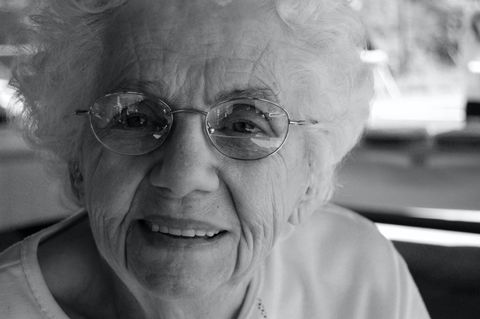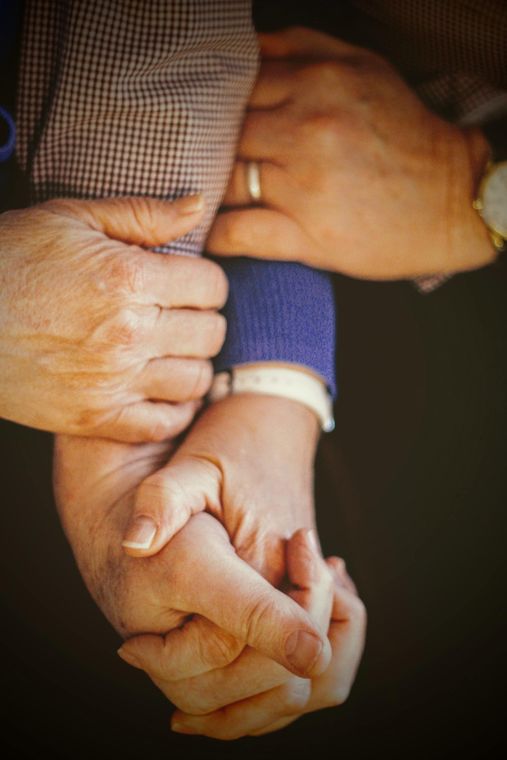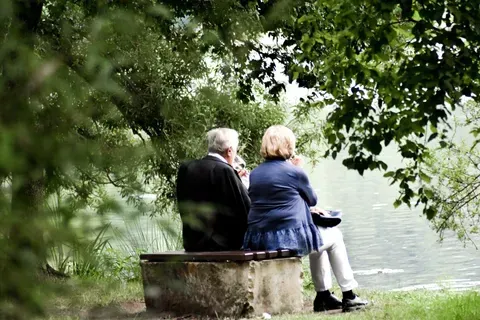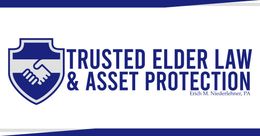01
Elder Law - What is it?
Protecting the elderly and their property, while guiding and advising the family

Elder Law is a growing specialty practice focused on planning for the care and protection of the elderly. With about 10,000 members of the Baby Boomer Generation turning 65 each day and rising costs of nursing home care, the demand for Elder Law attorneys like Erich M. Niederlehner is growing.
Elder Law encompasses several subsets of legal practice: the creation of a will, trusts, other estate planning documents, the legal management of benefits & annuities, protection of assets, and other aspects of life and law as one advances in age.
While the terminology of ‘Elder Law’ may sound daunting, Elder Law attorney Erich M. Niederlehner at the Trusted Elder Law & Asset Protection Law Firm acts to advise, assist, and counsel clients as their needs change and evolve with age.
Erich M. Niederlehner and Trusted Elder Law & Asset Protection Law Firm stand ready to serve our clients by planning for their golden years.
If you or a love one need help, we are here to guide you through the process. To learn more and to see if our Elder Law services are right for you, set an initial consultation. When calling our office at 1-855-ELDER-FIRM, our staff will explain what to expect and bring to your meeting.
BOOK NOW
Elder Law is a growing specialty practice focused on planning for the care and protection of the elderly. With about 10,000 members of the Baby Boomer Generation turning 65 each day and rising costs of nursing home care, the demand for Elder Law attorneys like Erich M. Niederlehner is growing.
Elder Law encompasses several subsets of legal practice: the creation of a will, trusts, other estate planning documents, the legal management of benefits & annuities, protection of assets, and other aspects of life and law as one advances in age.
While the terminology of ‘Elder Law’ may sound daunting, Elder Law attorney Erich M. Niederlehner at the Trusted Elder Law & Asset Protection Law Firm acts to advise, assist, and counsel clients as their needs change and evolve with age.
Erich M. Niederlehner and Trusted Elder Law & Asset Protection Law Firm stand ready to serve our clients by planning for their golden years.
If you or a love one need help, we are here to guide you through the process. To learn more and to see if our Elder Law services are right for you, set an initial consultation. When calling our office at 1-855-ELDER-FIRM, our staff will explain what to expect and bring to your meeting.
02
Nursing Home Medicaid Asset Protection Planning
Legally preserving assets for the nursing home patient and their family
Pensacola Elder Law attorney Erich M. Niederlehner with Trusted Elder Law & Asset Protection Law Firm helps our clients legally and ethically obtain government benefits, often worth hundreds of thousands of dollars to pay towards nursing home care. Our clients keep their savings to supplement their care while receiving Medicaid benefits instead of paying all assets to the nursing home while impoverishing their family and then going on Medicaid.
Elder Law attorney Erich M. Niederlehner at the Trusted Elder Law & Asset Protection Law Firm has made our fixed fee structure as straightforward as possible. The fixed fee structure is upfront, and everyone knows the costs, avoiding surprises and hourly rates. We strive for transparency, so the client knows precisely the fees are upfront. For any services that are billed hourly, they provide the client with an estimated cost range prior to being retained.
Family Asset Protection Planning (FAPP) covers five different modalities which the Elder Law Asset Protection Firm uses to help its clients:
(1) Asset protection in a long-term care context means the implementation of planning strategies designed to achieve eligibility for Medicaid or other needs-based means tested government benefit program(s).
(2) Estate Planning through many various estate planning documents, such as trust, wills, and different techniques of holding title to assets. The estate planning goal of a nursing home Medicaid applicant is to carry out the client’s after-death wishes, but we honor their wishes in a way consistent with the client’s asset protection goals. Most every client already comes with an estate plan, but these plans typically need to be changed to meet the new objectives of asset planning for needs-based government programs.
(3) Incapacity Planning is primarily planning directed for what should happen or continues to affect a client and to deal with any current incapacity issues. A regular, durable power of attorney does not suffice. Your template obtained from an online form company may end up doing more harm than helping. Incapacity planning includes end-of-life healthcare decision-making documents, powers of attorney, and sometimes trusts and other devices.
(4) Elder law attorney Erich M. Niederlehner of the Trusted Elder Law & Asset Protection Law Firm protects the client against Medicaid making a recovery against the Medicaid recipient’s estate upon their death.
(5) Application for Benefits: The Elder Law Asset Protection Firm will handle the claim for Medicaid benefits by completing the Medicaid application and dealing with the government throughout the eligibility determination. We are transparent and show the government all the planning that we have done on behalf of the Medicaid applicant by opening the books and explaining the law to the government caseworkers.
(6) Placement assistance: Trusted Elder Law & Asset Protection law firm provides placement assistance for you and loved ones. In the event you cannot find the proper nursing home or assistance living facility. We can cut through the red tape and find a new home for your loved one.
Whether FAPP is right for you depends on many factors that are specific to the individual and not covered on this website. We can help achieve your goals, including Medicaid eligibility in weeks or months (not after a 5-year waiting period). You or your family member have worked hard for your assets. Do not pay the nursing home until everything is gone. We will help you protect your life savings now, before it is all used for long-term care.
If you require help with long-term care Medicaid planning and asset protection, we are here to guide you through the process. To learn more and to see if our Elder Law services are right for your situation, set an initial consultation. When calling our office at 1-855-ELDER-FIRM, our staff will explain what to expect and bring to your meeting.

03
Elder Law Estate Planning
Protecting assets and passing on family legacies through proper estate planning

Elder Law attorney Erich M. Niederlehner at the Trusted Elder Law & Asset Protection Law Firm thinks there is more to estate planning than the writing of a simple will. Wills may be simple or complicated, depending on the family dynamics, income, assets, number and age of household members, tax status, and other considerations. While there are “do-it-yourself” forms on the market for “estate planning,” it is always best an attorney knowledgeable in the latest state and federal statutes and tax laws draft that wills and trusts.
Today, many attorneys also prepare for their clients a durable power of attorney(usually the most important document a potential Medicaid applicant can have) and a health care proxy. Wills, Trusts, Intestate Succession, Estate Planning and Administration all must follow the Florida Probate Code and the Florida Rules of Probate and Guardianship Procedure, which together with Florida Statutes Chapters 731, 732, and 733, all fall under the jurisdiction of the Florida Circuit Court. Working alone or in tandem with the client’s existing estate planning attorney, Trusted Elder Law & Asset Protection Law Firm is well equipped to prepare a comprehensive estate plan for its clients. We focus on you and what your goals and desires are, educate you as to the various planning methods and laws available, and help implement the plan.
Unlike traditional estate planning, which focuses on what happens after death, Trusted Elder Law & Asset Protection Law Firm approaches estate planning from the perspective of meeting lifetime needs first and then developing an after-death plan.
One primary purpose of estate planning is to make your wishes known how you want your assets distributed at your death, but proper planning means dealing with lifetime needs first. Therefore, we must focus on incapacity planning, long-term care needs and funding, asset preservation, access to health care, and other matters. After first dealing with lifetime needs, we can complete a successful estate plan and develop a plan to transfer your assets to your beneficiaries quickly and usually with minimal tax consequences.
The process of estate planning starts with inventorying your assets, then drafting a will and/or a trust. After the will and/or trust are drafted, we draft supplement documents such as healthcare surrogate documents, durable power of attorney, living wills, pre-need guardian and other such documents. Matters such as minimizing estate taxes, children with unstable marriages, children in need of a spendthrift trust, charitable inclinations, or preserving your assets against illnesses are additional issues that may need to be dealt with, sometimes involving other professionals like tax or financial advisors.
If you require assistance, we are here to guide you through the process. To learn more and to see if our Elder Law services are right for you, set an initial consultation. When calling our office at 1-855-ELDER-FIRM, our staff will explain what to expect and bring to your meeting.
04
Probate & Trust Administration
Guiding families through the legal process after death
Upon a person’s death, family members or others interested in the estate usually locate the will, if there is one, and contact an attorney to represent the estate. The estate’s attorney will open a probate case to probate the decedent’s will or petitioning an appropriate person to assume responsibility for administering the estate if there is no will. The attorney will prepare the petition and other documents for filing with the probate court and will represent the personal representative throughout the proceeding and, after that, in the estate's administration.
The probate estate comprises personal property owned solely by the decedent wherever located, whether tangible of intangible, and real property owned by the decedent in Florida, except for the homestead property. Remember, however, that real property owned by the decedent in Florida is not the homestead property until the Court enters an order determining that the property is homestead.
Non-probate assets pass outside of the decedent’s probate estate and are not subject to court supervision of distribution. Non-probate property includes various types of property such as life insurance with a named beneficiary designated and that beneficiary is not the decedent’s estate, jointly owned property with rights of survivorship, and property held by spouses as tenancy by the entireties. Also, the non-probate property can comprise an inter-vivos trust that the decedent had the power to revoke at the time of his/her death. See, §689.075, Fla. Stat. However, the trust assets are used to satisfy the expenses of estate administration and the claims of creditors if the probate property has insufficient funds. See, §733.707(3), Fla. Stat.
When a person dies leaving a will, he or she is referred to as having died “testate.” If a person dies without leaving a will, he or she is referred to as having died “intestate.”
In the case of a person who dies leaving a valid executed will, a court proceeding is started, and the execution of the decedent’s will is proved. An appropriate person (who usually is named/designated in the will) is appointed by the Court to serve as the “personal representative” to administer the estate.
If the person dies intestate, a petition for administration of the decedent’s estate, if filed with the Circuit Court in the county, the decedent resided. Then the probate court appoints a personal representative to administer the estate. Preferences in the appointment of the personal representative are governed by §733.301(1)(b), Fla. Stat. §§732.101 – 732.111, Fla. Stat. sets forth who inherits during an intestate proceeding.
The personal representative is responsible for assuming control over all the property owned by the decedent for the purpose of administering the estate. See, §733.608, Fla. Stat.
A Trust Agreement is the contract between the Settlor (creator of the trust) and the Trustee(s) of the trust. The agreement creates an imaginary person (trust) to hold, and own assets contributed to it by the Settlor. Generally, the Trust Agreement also outlines the rights and use of the trust assets, who the beneficiary are of the trust, the purpose of the trust. Your first job as a trustee is to review and understand the trust agreement. A “living” trust is made to take effect and be used during the lifetime of the Settlor. Generally, the trust will be “revocable” which means the Settlor may change and/or cancel the trust through amendment. Sometimes, a trust may be “irrevocable” so that it cannot be changed or canceled except in exceptional circumstances.
There are many reasons to create a trust. Not all the reasons listed below may be the cause for your Settlor to create the trust you administer.
The main reason for any living trust is to name individuals, in advance of need, so that someone can step in and handle financial affairs if the beneficiary cannot do so themself. With a properly funded trust in place and successor trustees named, if the Settlor becomes incompetent, there would be no need for a court-appointed guardian. In the end, someday nearly every person will need that support mechanism, and the trust provides it with built-in security measures to protect the initial beneficiary, which in most case is the Settlor of the trust. A Trustee should not act on behalf of the trust if the Settlor is capable of acting themself unless the Settlor tells the Trustee to do so.
Most estate planning attorneys use a trust to avoid probate. The Trustee has immediate access to the assets after the death of the initial beneficiary and can therefore hold, invest, manage, apply, or distribute assets as set forth in the Trust Agreement. Normally, a probate proceeding is unnecessary as to assets held in trust ownership, except in relatively rare circumstances. Saving probate saves the estate and the heirs money, time, red-tape, and aggravation.
If you require assistance or help, we are here to help guide you through the probate process. To learn more and to see if our Elder Law services are right for you, set an initial consultation. When calling our office at
1-855-ELDER-FIRM, our staff will explain what to expect and bring to your meeting.

05
Nursing Home & Assisted Living Facility Placement Assistance
Let us help find you a perfect new home for your situation in a nursing home or assisted living facility


